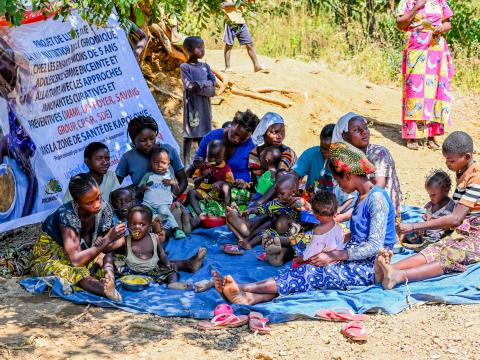DR Congo: Cured of malnutrition, the children of Kapolowe hope for a healthy future

By Tatiana Ballay – Communications Officer World Vision DRC
In the second phase of the project entitled "Combating malnutrition with innovative curative and preventive approaches in the Kapolowe Health Zone", implemented by World Vision DRC in collaboration with PRONANUT- Haut Katanga and the Kapolowe Health Zone funded by UNICEF a success story is taking shape.
This phase aims to build on the progress made in the first phase and significantly reduce the rate of acute and chronic malnutrition in children aged 0-59 months and moderate acute malnutrition affecting (pregnant and breastfeeding women in the Kapolowe Health Zone by 2025.
The results of the second phase of the project are commendable. A significant number of children suffering from severe acute malnutrition have been treated and have recovered, exceeding the targets set. The project monitoring report and that of the health zone show significant progress, with 82% of children treated in the 16 UNTAs and 3 UNTIs, marking a substantial improvement on previous phases.
"Since the start of the second phase, we have registered and followed up 63.3% of low-birth-weight or at-risk newborns and 46.6% of mothers with a specific health condition, representing a major step forward compared with the first phase. At the same time, the PCIMA approach has supported 1,637 malnourished children, most of whom are acute cases.
This improvement, together with the upgrading of our nutritional treatment centres, has led to more effective treatment of malnourished children. The results show an impressive cure rate of 93.24%. We are constantly looking for ways to strengthen our action and further improve the health of mothers and children,” Alain Muyenga, World Vision DRC Project Coordinator.
13-month-old Albert and his mother, Sylvie, live in the community of Kingoyi in Kapolowe Mission in Haut-Katanga province. Two months ago, Albert was having health problems, and Sylvie was deeply concerned. "He had a high fever, he wasn't eating and he was really thin. I couldn't bear to see him like that," she says.
Sylvie was made aware of the anti-malnutrition initiatives launched by the project in her community.
"One evening, I was perturbed. Albert was having breathing problems, and we went to the Lupidi2 health centre, where the nurse on duty examined him and informed me that he was suffering from severe acute malnutrition with medical complications. We immediately took him to the hospital that evening", says Sylvie.
Sylvie was worried because she didn't have enough money to cover the hospital costs. However, when she arrived at the hospital, she was reassured. Albert would benefit from free treatment thanks to the project.
"Albert has been treated free of charge since we arrived at the Kapolowe Mission general referral hospital. I'm not used to receiving such generosity".
Nurses have regularly assisted Sylvie, teaching her the correct way to feed Albert with soya porridge, maize flour, and vegetables. Now, Albert is cured.
"We're going to plant soya, sweet potatoes, and peanuts in our garden, and I'd be reassured if all my children ate them every day," she concludes.
This success story illustrates the power of community initiatives and integrated approaches in the fight against malnutrition and the promotion of health.
In April 2024, during the initial nutrition assessment, 1,876 malnourished children aged between 6 and 59 months were identified, including 684 uncomplicated SAMs and 1,192 MAMs. These children benefited from 12 days of support at 186 hostel sites, with 1,686 people responding to the call. At the end of these sessions, 1506 children had gained 200g or more in weight, enabling many to regain their initial health. On the 30th day of follow-up, 1319, or 78.2% of children had gained 400g or more after the DP Foyer sessions, which ended on 5 May 2024. Thanks to this weight gain, 742 of the 1686 children had fully recovered their health.
This success testifies to the parents' commitment to maintaining their children's health through the practices acquired during the Positive Deviance Foyer sessions, to the community ownership of the approach, and to the involvement of community members and faith leaders.
The Positive Deviance Hearth approach stands out as an essential pillar of the project, aimed at restoring the health of children suffering from Moderate Acute Malnutrition (MAM) and Severe Acute Malnutrition (SAM) without complications. This approach includes educating parents or carers about good hygiene, care, feeding, and health practices to preserve their children's health and prevent acute and chronic malnutrition in the long term.